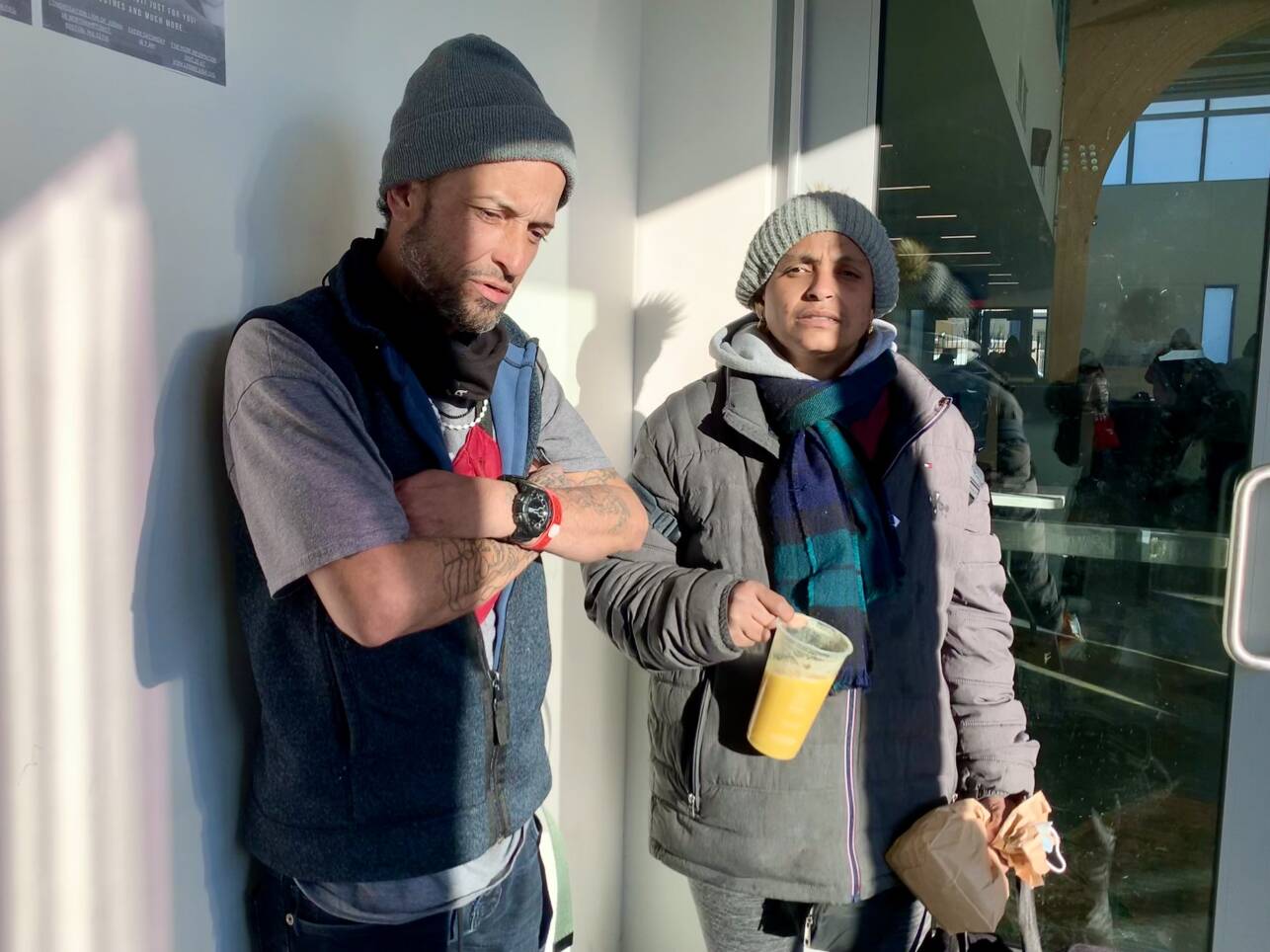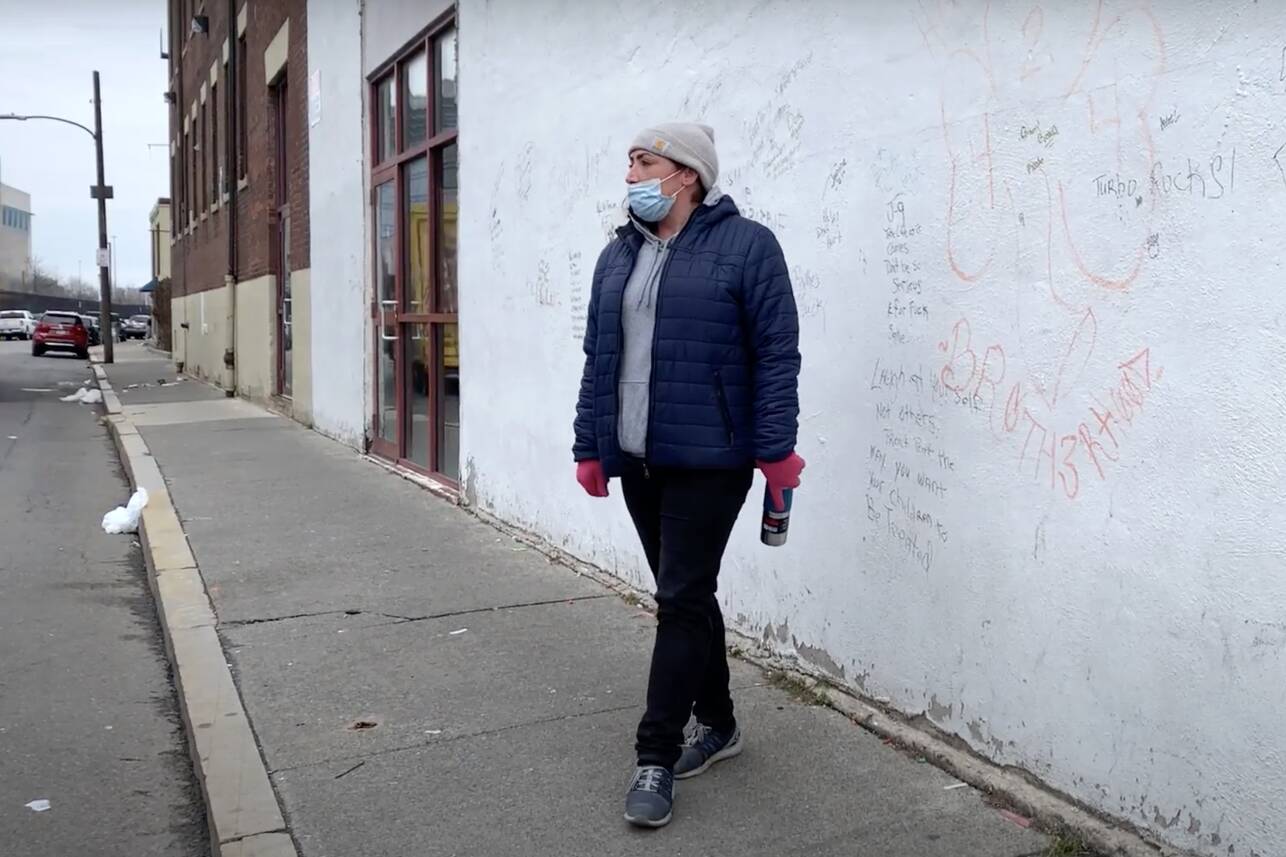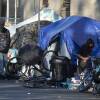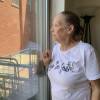For the first time in years, Max Kolodka could take a shower in his own bathroom. The apartment — a small studio in the Fenway/Symphony neighborhood with a view of the Boston skyline and the Citgo sign, a real mattress with sheets and blankets, a door with a lock — belonged to him.
“I had almost forgotten what it was like to be able to actually cook food, to be able to take a shower,” Kolodka, 33, said in a recent interview. “A year ago I was on the streets, struggling to find my next meal, what to wear for the day or where to shower, where to sleep without getting robbed. Here I am. I have a home now, a place I can call my own.”
Kolodka is one of 164 people who have been moved into transitional housing since efforts began in December to clear hundreds of tents spilling out into the streets around the intersection of Massachusetts Avenue and Melnea Cass Boulevard, known as Mass. and Cass. The city counted 145 people living in the area and set a deadline of January 12 to remove tents. After the sweep, 154 people were moved into housing, plus another ten since then, according to city officials.
The city’s efforts have been generally received with appreciation, but many outreach workers say that sweep has made it harder to find people who were displaced but did not go into housing — an estimated 100 people who were left behind, according to Bob Morgan, a social worker with nonprofit Project Do Something Boston.
“This push for housing that we’re seeing now is far and away the biggest push for housing that we have ever seen in six years of doing this. Nothing else has come close,” Morgan told GBH News. “But they undercounted the number of people out there. They underestimated the need, and people fell through the cracks. Now it’s a scramble to figure out what to do with them.”
Morgan’s wife Chrissy Joubert, who founded Project Do Something, has spent years building relationships with people experiencing homelessness near Mass. and Cass. She is now helping to connect city outreach workers with people who have found refuge under bridges, in train tunnels and elsewhere around the city.
“Our work is basically just to find those people that are out there now and to make sure that they get off the street,” Joubert said. “That’s really the only thing that can be done. Now we are basically finding all those people that missed out.”
In December, Boston Mayor Michelle Wu dispatched city outreach workers to connect with people living in the area, an effort that culminated in a day-long tent clearing last month that required people to remove their belongings under threat of arrest. Wu promised a “public health approach” to ensure that “every single person has a roof over their head,” she told GBH News at the time.
The city promised safe alternatives to living in tents and quickly arranged for six new housing options around the city for unhoused people — but some were left behind.
“If they’re going to say that we are giving them options, we are not going to leave them out in the cold, then you can’t leave them out in the cold,” Joubert said. “If you make a promise, you need to stick with that.”
Some 30 tents and structures are being destroyed at the Newmarket st encampment near mass and cass @GBHNews pic.twitter.com/JKXzyRdnoL
— Tori Bedford (@Tori_Bedford) January 12, 2022
After their tent was removed during the sweep, Avalberto Delbrey, who is HIV positive, and Wilnelia Reabyng, who has both lupus and myeloma (a cancer of the blood cells), told city outreach workers about their health concerns and were able to secure one week in a hotel. After that week, the couple found themselves back near Mass. and Cass without a housing option.
As of Saturday, Reabyng told GBH News that her cancer had progressed to Stage IV. After losing more than 100 pounds, she has decided to stop chemotherapy treatment.

“If the streets are going to take me, I might as well let cancer take me first,” Reabyng said in an interview Saturday. “I can’t fight both things at once.”
Delbrey said his doctor “has promised me housing, over and over, but at this point it’s just broken promises.”
Though a second census of the area has not been conducted, workers continue to “conduct daily outreach to individuals in the area and monitor for encampments,” a city spokesperson said in an email.
Approximately 450 guest beds are provided at shelters across Boston each night, according to city officials, and short-term financial support is being provided to those who need shelter.
“The Homeless Services Bureau’s goals are to make homelessness rare, brief and one-time,” a spokesperson from the Boston Public Health Commission said. “We believe everyone deserves housing.”
While some people who had lived in tents near Mass. and Cass have been able to return to the area and reach out to housing advocates, others have disappeared entirely.
One is Bernadette, who spoke to GBH News in November and asked to be identified only by her first name. She had struggled for months to get into detox before the sweep. According to her case worker at Boston Medical Center, Bernadette has not been seen or heard from in over a month.
At several sites across the city, including the nearby Roundhouse Hotel, the Evision Hotel in Mission Hill and the Shattuck Hospital campus in Jamaica Plain, four people have been removed from their temporary housing assignments and five others have left on their own, according to a city spokesperson.
At the Engagement Center, which the city’s health commission runs near Mass. and Cass, many longtime occupants of the former encampment return for medical care, food or a place to sleep off long nights spent under bridges, on park benches or bus station floors.
GBH News identified 12 people who formerly lived in the encampment who said they have not been offered transitional housing, including Jonathan Pagan, who stood with a group of about 75 people behind police tape blocking off the street on the night of the sweep. With no housing offered, he said in an interview he called 911 and spent that night in the emergency room.
"You just kicked me out of my tent. You said you were going to give me housing. Where is it?"Ice, who lived near Mass. and Cass, on the city’s sweep in January
Another man, Wander, who asked his full name not be used, said spent the night of the sweep on the sidewalk.
“They kicked us all out. I talked to four people who put my name on a list for housing and nothing happened,” a man who calls himself Ice told GBH News. “They just smiled at me. Don’t smile at me, you just kicked me out of my tent. You said you were going to give me housing. Where is it?”
“It’s like sweeping people under the rug, basically,” said Kolodka. “And while I don’t think there’s any quick, easy solution, they should have made sure that their plan could be executed before rushing to tear down people’s tents.”
The street clearing was fast — executed in a day, with pressure to get people out of tents during some of the coldest temperatures this winter. An additional push came from local residents and members of the Newmarket Business Association, who have expressed concerns about crime and public health since tents first started appearing in the area following the closure of the Long Island shelter in 2014.
In the weeks following an earlier clearing of some 350 tents conducted by then-acting Mayor Kim Janey last November, new encampments emerged , occupied predominantly by unhoused people who said in interviews they would rather sleep outside than risk robbery, assault or COVID-19 exposure in a shelter. Some who are still outside say that it’s hard to have faith in a waiting game that seems to favor some and leave others behind.
But many of those who have been housed, some after years of fighting, are amazed at how quickly the city was able to act.

“I was like, I don’t care, I’ll sign up for anything. I thought it was just going to be another something,” Heidi King said in an interview at her new studio apartment overlooking Mass. and Cass. “I signed the lease and I was like, this still ain’t gonna happen. It took me physically coming up here with my stuff to believe that I live here.”
At 40 years old, King has spent the last 15 years in and out of homelessness, shelters, detox facilities, prisons and psychiatric facilities for severe PTSD. In the last seven years living on the streets of Mass. and Cass, King met regularly with housing advocates and put her name on waiting lists — but this was the first time anything ever came to fruition.
“This is something I never thought would ever happen to me, I never ever thought that I could do this,” King said. “Last year, I would never think I’d be sitting here right now.”
King says she knows several people who have lived on the streets of Mass. and Cass for years, including some who built the first tents on Atkinson Street that grew into the larger encampment.
“There are people who can’t be reached, people that are still waiting, and it’s sad,” King said. “They should have been the ones that got housing as well. It’s luck of the draw, I guess.”
King spent last week at an inpatient detox program at Boston Medical Center. Now that she’s returned, she says she plans to try to find a dedicated therapist and work with housing advocates to secure permanent housing.
“I can finally heal — heal my relationships with my family, with my kids, most importantly,” King said. “It’s so much harder on the street. On the street, there’s a lack of support. Drugs and alcohol go hand in hand with mental health problems.”
More Local News
Recovering from substance use, trauma or medical issues is impossible while experiencing homelessness, Kolodka said after he returned to his apartment following a long-awaited doctor’s appointment at Boston Medical Center.
“You’re surrounded by drugs, and maintaining simple things like doctor’s appointments or holding onto a phone is just exceedingly difficult,” he said. “It makes maintaining sobriety while homeless just impossible.”
Having a home is not a solution to every problem, but it gives people like him a chance to fight for their lives, Kolodka said.
“A lot of people look at homeless people and they see poor choices, but everyone makes poor choices at some point,” he added. “I think people need to understand how difficult it is to dig yourself out of the hole of being homeless.”
In the months leading up to securing his housing in early January, Kolodka found himself swept up into a carceral system that offered rehabilitation, only to leave him back on the streets of Mass. and Cass. During Janey’s street clearing in November, Kolodka was arrested on four outstanding criminal warrants — for breaking and entering, driving under the influence and possessing illegal drugs — while waiting in line at a methadone clinic. Police brought Kolodka to the Suffolk County Jail, where he and 16 others from Mass. and Cass were processed at a short-lived makeshift court house .

Though a treatment bed was available, Kolodka was sent to the Worcester County House of Correction to detox without medical treatment, spending a week in isolation on the floor of a jail cell.
“No bed, no toilet paper, the lights were on 24/7, and they do not provide methadone,” Kolodka said. “It was probably the most awful way I could possibly imagine for anyone to kick opiates. Your bones hurt. You can’t sleep. It’s inhumane torture. I lost my will to live. If I could have flipped a switch on my life, I would have done it.”
After making bail, Kolodka spent short stints at two addiction treatment centers in Worcester and Boston before finding himself back on the streets near Mass. and Cass, walking to stay awake and alive on the freezing December nights. Within two weeks, outreach workers contacted Kolodka with good news: an apartment was available.
At his new home, Kolodka watched the sun set from the window and reflected on the “absolutely surreal” past few months. Now, he says, there is room to consider his goals for the future: a chance to go to school, a part-time job, a library card.
“I feel like I have hope now,” Kolodka said. “I feel like I can dream again and that a better — even if just normal — life is tangible in a way I couldn’t hope to imagine just a few months ago.”
When asked if he feels like he escaped Mass. and Cass, Kolodka paused.
“In a way, but part of it will always be with me,” he said. “Honestly, I have scars and also good experiences. That will always be with me.”





